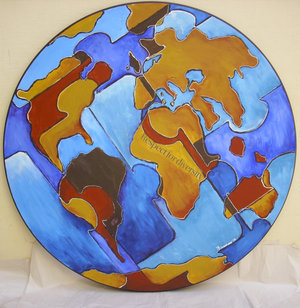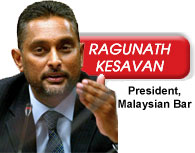But are Chin Peng and Lee Kuan Yew mentioned in this context? They were significant players in the creation of Malaya and later, Malaysia. What we read is about Umno this and Umno that. We are told that Malaya gained independence and Malaysia was later created because of Umno.
NO HOLDS BARRED
Raja Petra Kamarudin
Malaysian students abroad told to be wary of media spinning
(Bernama) - Tan Sri Muhyiddin Yassin today advised Malaysian students abroad to be wary of some Malaysian media that are inclined to spinning news stories and spreading lies.
"I ask that the students understand the situation to prevent themselves from being influenced by the news spins and lies," he told a press conference after a dialogue with a group of Malaysian student leaders from throughout Indonesia, here, today.
Muhyiddin, who is on a four-day working visit to Indonesia since yesterday, was responding to the student leaders' call for the Malaysian media to be truthful and transparent in their news reports.
"I explained that the media was very influential, and while there were media which were supportive of the government, there were others that belonged to the opposition or were pro-opposition, with some of them good at spinning stories," he said.
Also present at the dialogue were Malaysian ambassador to Indonesia Datuk Syed Munshe Afdzaruddin Syed Hassan and director of the Malaysian Students Department in Indonesia, Datuk Dr Junaidy Abu Bakar.
The deputy prime minister agreed that a seminar on the 1Malaysia concept be organised for the Malaysian students in Indonesia and other Malaysians in Jakarta so that they would understand the concept better.
He said experts on the concept could be invited to give talks and interact with the seminar participants here.
Muhyiddin said the Malaysian student leaders also expressed their support for the government's decision to abolish the Penilaian Menengah Rendah (PMR) examination, but wanted the school-based assessment system that would replace the PMR, to be a sound and viable one.
****************************************
It is certainly sound advice that Deputy Prime Minister Muhyiddin Yassin gave to Malaysian students overseas. History as taught in Malaysian schools in the 1950s and 1960s was very different from the history being taught today.
The history that I learned in the Alice Smith School in Kuala Lumpur starts from 1066. I had to research on my own the history of 55 BC when the Romans under Emperor Claudius unsuccessfully invaded England and were sent packing back to Rome with their tails between their legs. The general who suffered this most humiliating defeat was none other than Julius Caesar himself who later on became Emperor of Rome.
It was not until almost 100 years later that the Romans managed to tame England -- but then only stayed for about 367 years before they decided to call it quits and abandon England’s shores for good.
The Romans could not bear the extremely cold English weather and extremely hot resistance from the Britons who never allowed the Romans one bit of peace. England, of course, was thereafter invaded by many regional powers such as the Vikings and the political boundaries of Great Britain were redrawn many times over those 600 years before the Norman invasion of 1066.
For some time England was ruled by France and there were occasions when the English king spoke only French. In fact, the language of the English court at that time was French and not English.
There is no longer any such thing as an Englishman. The term Englishman is a misnomer. What would you regard as an Englishman? For 2,000 years England had been occupied by one power or another, and at times many powers at the same time. The blood of the Englishman has been ‘contaminated’ by almost every known Caucasian.
In short, the Englishman jati (pure) is a fallacy and does not exist.
That is how I have understood history. And that was what we were taught in school back in the 1950s and 1960s.
Malaysian history, however, starts from 1946, the year Umno was born. And Malaysian students are taught that Umno fought for independence. They are also taught that the British tried to undermine the Raja-Raja Melayu (Malay Rulers) by introducing the Malay Union. In speeches by Umno leaders we are even told that the Rulers ‘sold out’ to the British and if not for Umno, who defended the Rulers, the Malay Rulers would no longer exist today.
Some try to downplay the ‘treacherous act’ of the Rulers by saying that the British tricked the Rulers into agreeing to the Malayan Union and it was Umno who pressured the Rulers to abort the plan. Without Umno the Rulers would have kowtowed to the British and would have lost all their powers.
In short, the Rulers had to be saved from themselves and it was Umno that had saved them.
Yes, there are much lies and spinning, as Muhyiddin said. Malaysians are not being taught real history. They are being taught Umno’s version of history. So what Muhyiddin said is true: Malaysians overseas must be careful of these lies and spins.
But it is the lies and spins of Umno that Malaysians must be careful of. What we are being told is not what really happened. Sure, Umno did send a delegation to meet the British to oppose the Malayan Union. But who were these so-called ‘Umno people’?
They were not the rakyat. The rakyat did not care. They were not concerned. In fact, they were not even aware about what was going on.
Those who went to meet the British were the orang istana or people from the royal court, the palace people. Is it any wonder that they all had Raja or Datuk in front of their names? In fact, Umno was ‘born’ in the palace of the Sultan of Johor. For all intents and purposes it was a ‘royal effort’.
So dispel all this talk about the Rulers selling out to the British and that Umno, a party of the rakyat, saved the Rulers who had agreed to the Malayan Union due to their ignorance. Many of the royalty then were well educated and were more English than the Englishman. I remember my grandfather speaking just like Winston Churchill. How more English than that can you be?
The British, then, were good at what they called ‘gunboat diplomacy’. They ‘persuaded’ foreign leaders to agree to the terms of His Majesty’s government with a gun at the head. Did they not use the same tactics on the Chinese Emperor to gain Hong Kong?
Umno, at that time, were not seeking Merdeka. They only wanted the British to abandon the Malayan Union and opt for a Federation of Malaya, which eventually did happen two years later. It was MCA that first broached the subject of Merdeka.
The British, of course, would not talk to MCA unless the Malays too were in the equation. The MIC at that time did not bother about Merdeka. MIC was a communist party that was more concerned with independence for India. Malaya was not their home. India was.
It was not until the Communist Party of Malaya (CPM) stepped up the insurgency -- which resulted in the British declaring the Malayan Emergency -- that the British decided it would be prudent to allow Malaya self-rule. Many would not agree with me, of course, but I would dare say that Chin Peng accelerated Merdeka. If not, Malaya would have gained independence much later than 1957.
In fact, Malaysia too came about because of the Communists. Lee Kuan Yew was one smart cookie. He made a deal with the CPM who swept half the seats in the Singapore elections. This frightened the British who saw Singapore falling to the Communists.
Lee Kuan Yew told the British that the only way to stop the march of the Communists was to give Singapore independence so that, together with Sabah and Sarawak, it could form a new country with Malaya that would be called Malaysia. Singapore, on its own, would fall to the Communists. As part of Malaysia the Communists could be stopped.
So, while Chin Peng accelerated Merdeka, Lee Kuan Yew ‘convinced’ the British to give independence to Singapore so that it could join Malaya to form Malaysia. Of course, Singapore was not really interested in being part of Malaysia. It just wanted independence. And not long after that it left Malaysia to become an independent Republic of Singapore, which was what Lee Kuan Yew really wanted.
Lee Kuan Yew then got rid of the Communists by detaining them all without trial. He had used them to frighten the British and now no longer had any use for them. So he rounded them up and locked them away for a long time, the sneaky bugger.
But are Chin Peng and Lee Kuan Yew mentioned in this context? They were significant players in the creation of Malaya and later, Malaysia. What we read is about Umno this and Umno that. We are told that Malaya gained independence and Malaysia was later created because of Umno.
These are the lies and spins that Malaysians overseas and at home must be wary of. The history you are being taught is not the real history. What I have just related is the real history. But rest assured not a single Umno member would admit this. They are too ashamed to admit it. By admitting this they would be admitting that Umno is not really the hero that they pretend to be.












 The Bar Council’s Committee on
The Bar Council’s Committee on 




 Kemahiran Yayasan Selangor (IKYS).
Kemahiran Yayasan Selangor (IKYS).

